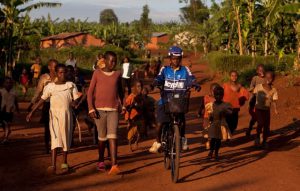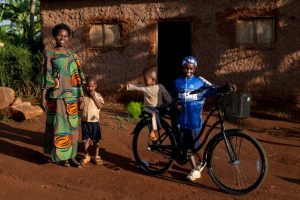By guest blogger Steve Madden, vice president of creative services and digital production development at Rodale.
I can’t tell you his name, but I can tell you the circumstances of his birth. His father, a Hutu, raped his mother, a Tutsi, after killing her family. During the rape, she became infected with HIV/AIDS. And she became pregnant. She bore the child and has raised him these 15 years. But she has never loved him. They live in the outskirts of a village in rural Rwanda, outcasts in a country that still bears the scars of the 1994 genocide that left some 1 million Tutsis dead and left countless others to deal with the trauma.
BikeTown Africa has provided almost 3,000 bikes to people in nine African countries. As cofounder of the project, I’ve been to most of those countries, as well as Afghanistan, and have seen and heard of the kind of deprivation, sorrow, and hardship we in the First World have come to associate with Africa. But I’ve never heard the kind of horror I heard earlier this month when I spent a week on a BTA project in Rwanda. We had partnered with Foundation Rwanda, an American charity that provides support to women who were raped during the genocide, and to the children they bore as a result of the rape. Many of them are HIV-positive, and all of them are outcasts in a society that is struggling to right the wrongs of the genocide while also trying to put it behind it as best it can.
The women receive some support from the government as victims, but the children, born after the genocide had officially ended, do not. The children are reminders both to mothers and society alike of the horror. The result: an untouchable caste.
We provided 120 BikeTown Africa bikes, generously donated by Canadian bike maker Kona, to the families supported by Foundation Rwanda. The mothers and their children gathered to help our small crew of Americans build the bikes, and we showed them how to maintain them. I worked with the boy, who is 15 but looks, because of malnourishment, like my 8-year-olds, for three days, and would hire him in a minute, such was his hustle, dedication, and attitude.
The Africa Bike was specially designed by Kona for women, since the vast majority of users of the bike are women in rural areas of Africa, who wear traditional dress of skirts. Hence the step-through, “girl’s,” frame; the chain case to keep the fabric away from the greasy chain; the basket, rack, fenders, and wide seat. The women told us they’d use the bikes to fetch water and firewood, as well as feed for their livestock. The kids said they’d use the bikes to get to school. We showed a few moms how to ride, and told kids whose moms couldn’t get the hang of it that they needed to give their moms lifts to the counseling sessions that Foundation Rwanda organizes.
We also told them the bikes were theirs. Forever.
I’m not naïve enough to think these bikes are going to make everything right for these families. But in a season when we are surrounded by so much, by a superabundance of plenty of everything, it’s good to know that a relatively modest investment of time and money can move someone whom the world has dealt a massively unfair hand from the have-not side of the ledger to the have side.
Please consider making a life-changing gift to BikeTown Africa. You can do so at BiketownAfrica.org, or at RodaleInstitute.org/biketownafrica.






I feel blessed to be part of a company that cares enough to be part of the BTA effort.